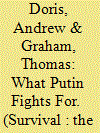| Srl | Item |
| 1 |
ID:
145228


|
|
|
|
|
| Summary/Abstract |
Did the United States promise the Soviet Union during the 1990 negotiations on German reunification that NATO would not expand into Eastern Europe? Since the end of the Cold War, an array of Soviet/Russian policymakers have charged that NATO expansion violates a U.S. pledge advanced in 1990; in contrast, Western scholars and political leaders dispute that the United States made any such commitment. Recently declassified U.S. government documents provide evidence supporting the Soviet/Russian position. Although no non-expansion pledge was ever codified, U.S. policymakers presented their Soviet counterparts with implicit and informal assurances in 1990 strongly suggesting that NATO would not expand in post–Cold War Europe if the Soviet Union consented to German reunification. The documents also show, however, that the United States used the reunification negotiations to exploit Soviet weaknesses by depicting a mutually acceptable post–Cold War security environment, while actually seeking a system dominated by the United States and opening the door to NATO's eastward expansion. The results of this analysis carry implications for international relations theory, diplomatic history, and current U.S.-Russian relations.
|
|
|
|
|
|
|
|
|
|
|
|
|
|
|
|
| 2 |
ID:
054045


|
|
|
| 3 |
ID:
106341


|
|
|
|
|
| Publication |
2011.
|
| Summary/Abstract |
This article investigates not the causes of the end of the Cold War but the legacy of its ending for international politics in the post-Cold War era. To do so, this essay offers the concept of 'settlement architecture' as a way of understanding the political resolution that follows a historical moment of thoroughgoing transformation, of which the end of the Cold War was a prime example. In particular, it explores both the nature of the settlement architecture advanced successfully by Washington and Bonn in 1990, namely prefabricated multilateralism, and the consequences of that settlement.
|
|
|
|
|
|
|
|
|
|
|
|
|
|
|
|
| 4 |
ID:
177525


|
|
|
|
|
| Summary/Abstract |
IN 2020, Germany - currently the leading European member of NATO - celebrated 30 years since the completion of the unification process of the FRG [Federal Republic of Germany] and the GDR [German Democratic Republic]. A year prior marked 70 years since the creation of NATO itself. On the eve of that anniversary, James Mattis, then American Secretary of Defense, speaking at a meeting of defense heads of this bloc in Brussels, called it "the most successful military alliance in modern world history" [1].
|
|
|
|
|
|
|
|
|
|
|
|
|
|
|
|
| 5 |
ID:
186366


|
|
|
|
|
| Summary/Abstract |
Russia’s invasion of Ukraine has reignited debate over the role of NATO expansion in producing the current crisis. Robert Person and Michael McFaul dismiss Russian President Vladimir Putin’s NATO concerns as a ‘fiction’, arguing that it was actually the expansion of democracy that threatened his autocratic regime. This argument draws a false distinction between trends Russians view as deeply entwined. Democracy and NATO expansion were not separate issues for Putin and the Russian elite, but mutually reinforcing elements of a concerted Western effort to contain Russia’s ambitions as a great power. Putin’s distaste for democracy does not overshadow but rather reinforces his objections to NATO. Because NATO expansion played an important role in producing the invasion, halting that expansion might have persuaded Putin to pursue his goals through less violent means.
|
|
|
|
|
|
|
|
|
|
|
|
|
|
|
|
| 6 |
ID:
184553


|
|
|
|
|
| Summary/Abstract |
Russia’s military operation in Ukraine, illegal in terms of the pre-1990s
international law and probably a geopolitical miscalculation, has caused
a shock incomparable even with that of the 2003 American attack on Iraq
that was proudly baptised Operation Shock and Awe. Remarkably, neither
the twenty-year-long war in Afghanistan waged by the U.S. and its allies, nor
the destruction of Libya in 2011, nor the multiple military interventions in
Africa, nor even NATO’s bombardment of Serbia in 1999—the first unlawful
use of force in post-WWII Europe—have caused such anger. There is always
a whiff of racism in the fact that wars waged against people who have
chosen to be on the “wrong side of history” are not condemned by those
on “right side of history” as they must be. How did it happen that after the
fall of the Berlin Wall and reasonable expectations of a peaceful future, the
world found itself in a situation where the use of military force has become
nearly normal unless it is used against Europeans who chose the “right
side of history”? How and why, in the race towards “the end of history” the
|
|
|
|
|
|
|
|
|
|
|
|
|
|
|
|